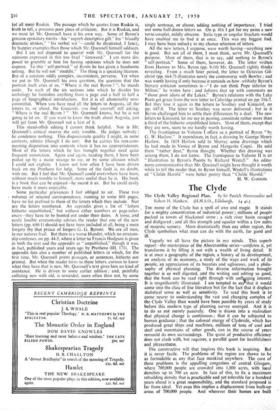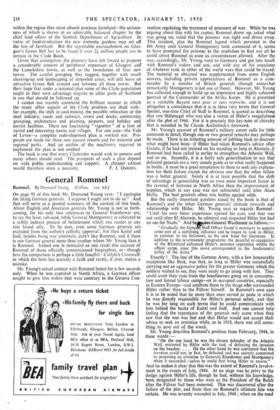The Clyde
THE name of the Clyde has a spell of awe and magic. It stiaids for a mighty concentration of industrial power; millions of people packed in towns of blackened stone ; a rich river basin ravaged and disfigured ; and all this strength and squalor within a few miles of majestic scenery. More dramatically than any other region, the Clyde symbolises what man can do with the earth, for good and Vaguely we all have the picture in our minds. This superb report—the masterpiece of the Abercrombie series—confirms it, yet transforms it by filling it out with a wealth of living detail. It is at once a geography of the -region, a history of its development, an analysis of its economy, a study of the ways and work of its people, an appreciation of its beauties and uglinesses, and a philo- sophy of physical planning. The diverse information brought together is so well digested, and the writing and editing so good, that the book can be read right through with unflag.ging interest. It is magnificently illustrated. I am tempted to sayirthat it would come into the class of fine literature but for the fact that it displays statistical sense as well as sensitivity. To read this book is to come nearer to understanding the vast and changing complex of the Clyde Valley than would have been possible by years of study before this modern type of planning survey emerged. And it is to do so not merely passively. OneS is drawn into a realisation that physical change is continuous ; that it can be subjected to human guidance ; that the colossal energy of Clydeside, which has produced great ships and machines, millions of tons of coal and steel and mountains of other goods, can in the course of years remould its own surroundings. The quest of productive efficiency does not clash with, but requires, a parallel quest for healthfulness and pleasantness.
The constructive will that inspires this book is inspiring. But it is never facile. The problems of the region are shown to be as formidable as any that face mankind anywhere. The core of these problems is the appalling congestion of central Glasgow, where 700,000 people are crowded into 1,800 acres, with local densities up to 700 an acre. In face of this, to fix a maximum rebuilding density that is practicable and yet tolerable for a hundred years ahead is a great responsibility, and the standard proposed is far from ideal. Yet even this implies a displacement from built-up areas of 700,000 people. And wherever their homes are built within the region they must absorb precious farmland—the serious- ness of which is shown in an admirably balanced chapter by the chief land officer of the Scottish Department of Agriculture. In value of food-production the new domestic gardens may set off the loss of farmland. But the regrettable encroachment on Glas- gow's Green Belt has to be faced if over 21 million people are to remain in the Clyde Basin.
Given that assumption, the planners have felt forced to propose a considerable amount of peripheral expansion of Glasgow and the Lanarkshire towns, as well as the foundation of four new towns. The careful grouping they suggest, together with much cleaning-up and landscaping of despoiled areas, wilt still leave an attractive Green Belt around and between all these towns. But their hope that under a national plan some of the Clyde population might to their own advantage migrate to other parts of Scotland is one that should be followed up.
I cannot too warmly commend the brilliant manner in which the many other aspects of the Clyde problem are dealt with: for example, the shift in coal-mining, the possible relocation of the steel industry, roads and railways, rivers and docks, community grouping, architecture and planting, airports, and holiday and tourist facilities. There are fascinating " vignettes " of a host Of varied and interesting towns and villages. For one area—the Vale of Leven—a complete redevelopment plan is worked out. Pro- posals are made for three new coastal resorts and for national and regional parks. And an outline of the machinery required to implement the plan is not omitted The book is one that every Clydesider would wish to possess and many others should read. The prospects of such a plan depend on wide public understanding and support. A cheaper edition would therefore seem a necessity. F. J. OSBORN.











































 Previous page
Previous page